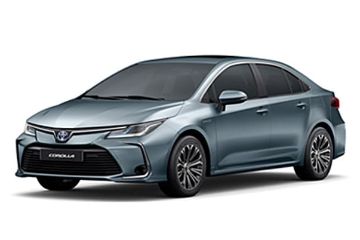![Review: All-new 2019 Toyota Corolla Altis is here to battle the Civic 01]()
Toyota Corolla Altis | Gallery
The Corolla is Toyota's most storied nameplate. So steeped is its heritage that by the late ‘90s, the Corolla name had become too successful for its own good. The name had become a drag because younger buyers associated the name too much with their father's car. Thus explains the introduction of the "Altis" suffix.
Irrespective of what it's called, the Corolla (Altis) has always stood for quality, dependability, and reliability. Toyota folks like to call it QDR.
![Review: All-new 2019 Toyota Corolla Altis is here to battle the Civic 01]()
Rarely has any generation of Corolla stood out for having the most spacious interior, newest technology or having the most powerful engines. None of that mattered to customers looking for a dependable car.
All generations of Corolla were developed with the so-called 80-point doctorine, meaning that a Corolla has to be above average in all aspects, covering all bases but not necessarily being the best in any particular area.
![Review: All-new 2019 Toyota Corolla Altis is here to battle the Civic 02]()
It's a formula that has served the Corolla nameplate well and few brands can boast of a continuous history longer than the Corolla, which was first introduced in 1966.
![Review: All-new 2019 Toyota Corolla Altis is here to battle the Civic 03]()
So it's not surprising that the latest Corolla Altis is the way it is – good enough in many aspects, but not exactly the best in any specific criteria.
![Review: All-new 2019 Toyota Corolla Altis is here to battle the Civic 04]()
The latest Corolla Altis now comes with only one engine choice – the 2ZR-FE 1.8-litre Dual VVT-i. Regionally, there's no more 2.0-litre variants as that spot in the model hierarchy is now taken over by the 1.8-litre hybrid, which we don't get.
Why? Well that's a question best directed to Ministry of International Trade and Industry, which at point of writing, has yet to announce our National Automotive Plan while our neighbours are decisively pulling ahead.
![Review: All-new 2019 Toyota Corolla Altis is here to battle the Civic 05]()
The highlight of this model is its all-new TNGA platform - which promises superior ride and handling – as well as the inclusion of Toyota Safety Sense advanced driving aids.
It's no longer fair to make fun of Toyota cars for their poor level of safety features. The Toyota Vios, Yaris, and Toyota Corolla all boasts of superior safety features than equivalent Honda models.
![Review: All-new 2019 Toyota Corolla Altis is here to battle the Civic 06]()
Exterior
In terms of size, the Toyota Corolla Altis is just as long as the Honda Civic, but it's narrower and taller. As such, the interior is quite cramped.
![Review: All-new 2019 Toyota Corolla Altis is here to battle the Civic 07]()
The Toyota Corolla Altis' deficit in space is a lot more than the 19 mm narrower body suggests, as the Honda Civic benefits from a very space-efficient packing that frees up a lot more space inside its cabin.
![Review: All-new 2019 Toyota Corolla Altis is here to battle the Civic 08]()
Interior
Shoulder room is tight and the car is best used as a four-seater. Rear occupants benefit from rear air-conditioning vents but there's no USB ports.
![Review: All-new 2019 Toyota Corolla Altis is here to battle the Civic 09]()
Up front, the Corolla Altis' cockpit has a higher hip point, so it's easier to get in and out of compared to the low slung Civic. However, there isn't a lot of space for your house keys, access cards, mobile phone or wallet.
![Review: All-new 2019 Toyota Corolla Altis is here to battle the Civic 10]()
![Review: All-new 2019 Toyota Corolla Altis is here to battle the Civic 11]()
The flat surface wireless charger below the centre stack is a nice thought but it is not practical because your phone will slide off after a couple of corners. We would gladly swap it for a proper utility bin to empty our pockets into.
![Review: All-new 2019 Toyota Corolla Altis is here to battle the Civic 12]()
The instrument panel switches from blue illumination to red once you switch the CVT transmission to Sport mode – which doesn't do much apart from holding the virtual ratios longer.
![Review: All-new 2019 Toyota Corolla Altis is here to battle the Civic 13]()
The infotainment however, was a bit of a disappointment as our local market misses out on the cooler looking free-standing screen that other markets get. There's no Android Auto/Apple CarPlay (available in the Honda Civic) but Toyota offers Mirror Link-like solution (you need to download the T-Link app to work). However, using Mirror Link also means that your phone's screen needs to be on all the time.
Update 1-June 2020: The Toyota Corolla Altis 1.8G now gets a 9-inch infotainment with Apple CarPlay/Android Auto. Price has gone up by RM 3,000 to RM 139,888, but the price now includes vehicle telematics security system (previously optional).
Driving experience
![Review: All-new 2019 Toyota Corolla Altis is here to battle the Civic 14]()
On the move, the Corolla Altis lacks the outright pace of the turbocharged Civic. However it counters the 30-plus PS deficit in power by delivering a much smoother drive. Power delivery is so smooth that it's hard to believe that this is a four-cylinder engine.
![Review: All-new 2019 Toyota Corolla Altis is here to battle the Civic 15]()
The engine might have been on the market for 10 years old but it's a lot smoother than its younger rivals, thanks to a lot of fine tuning and improvements. There's also zero doubt about it's reliability.
![Review: All-new 2019 Toyota Corolla Altis is here to battle the Civic 16]()
The CVT has also been improved. It feels more direct and gone is the previous model's cat-like whine when pushed hard.
On highways, the ride is notably more supple and forgiving against rough tarmac than the slightly firmer and noisier Honda Civic.
![Review: All-new 2019 Toyota Corolla Altis is here to battle the Civic 17]()
The adaptive cruise control (Toyota calls it Dynamic Radar Cruise Control) works at all speeds, and it works well enough with our local traffic, coming to a full stop to allow cars to merge into our lanes, before accelerating again, all without us touching the pedals.
Of course, the driver must still be responsible for the car's operations. It's meant to assist the driver, not replace.
Likewise for the Lane Tracing Assist, which isn't too intrusive and works well enough to keep you at the centre of the lane, thus reducing fatigue in long distance drives.
![Review: All-new 2019 Toyota Corolla Altis is here to battle the Civic 18]()
The TNGA platform promises sportier handling and it certainly feels so. The chassis feels taut and the double wishbone setup in the rear keeps the car planted and agile. It feels like the car can handle a lot more power and it wants to play but the steering wheel's response feels like it has been intentionally numbed down a couple of notches.
![Review: All-new 2019 Toyota Corolla Altis is here to battle the Civic 19]()
The steering wheel is light but so is the Honda Civic and we didn't complain too much about the latter. In the Corolla Altis, it felt that there was a layer of soft pillows masking feedback from the front wheels, which was a little frustrating since the chassis can handle a much sportier drive.
Oddly, the mechanically identical but taller riding Toyota C-HR didn't felt that way, and was a lot more fun to drive despite the lack of power.
![Review: All-new 2019 Toyota Corolla Altis is here to battle the Civic 20]()
Probably Toyota wants to maintain a mature character for the Corolla Altis and that's understandable because on straight roads and long distance drives, the Corolla Altis' steering is less fidgety and calmer than its sportier rivals.
![Review: All-new 2019 Toyota Corolla Altis is here to battle the Civic 21]()
Conclusion
Overall, the Toyota Corolla Altis is everything that we had come to expect. It matches what the competitor offers but never quite exceeding it. It's the dependable car that you know will give you a problem-free drive and if you take good care of it, will last long enough to be passed down to the next generation.
![Review: All-new 2019 Toyota Corolla Altis is here to battle the Civic 22]()
We love its safety features and comfort but wished it was a bit more spacious inside. The dated engine and lack of power didn't really bother us. The updates are good enough and few Corolla Altis customers will be bothered about its low output. The lack of practicality in the cabin however, might bother them, especially since it's supposed to be a practical Toyota.
A more detailed full review will be done once we are able to spend more time in the car.






























